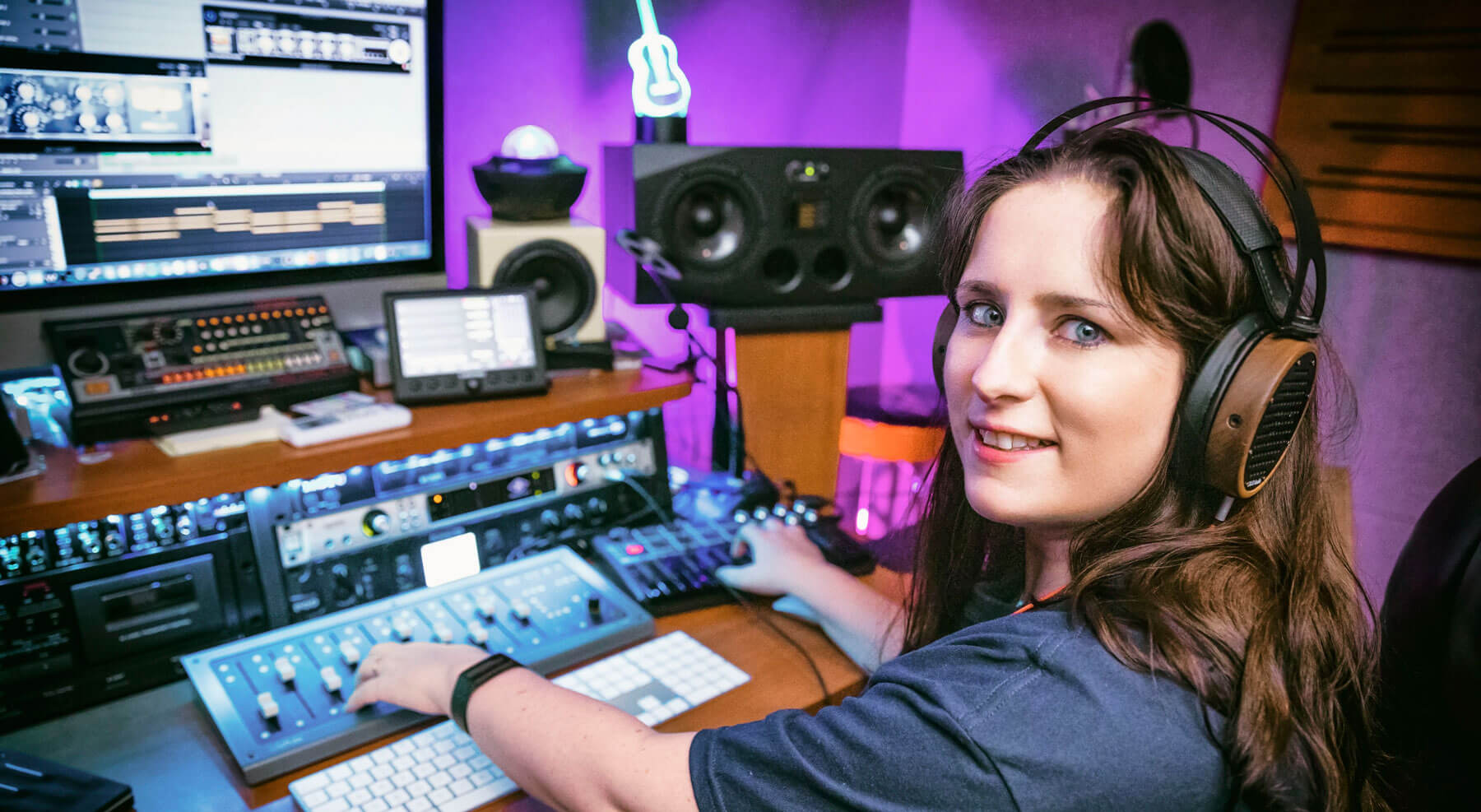
The epitome of the agile, versatile, industrious contemporary freelance musician, they don’t come much more inspirational than Aubrey Whitfield. This tireless London-based songwriter, producer and engineer has worked with household names such as Kelly Clarkson, Little Mix and George Shelley, and literally hundreds of independent acts; and contributed music to hit TV shows such as Love Is Blind, Celebrity Bakeoff and UEFA Euro 2020.
She’s also an artist in her own right – her latest single, Secret Hideaway, has been making waves since its release in March – and an educator, too, providing a range of tuition services and music production guides via her Patreon. Away from the studio, meanwhile, Aubrey’s championing of gender diversity in the music industry has led to an ongoing affiliation with SheSaidSo’s Alt Power 100 List, and she recently sat on the panel for BMG’s International Women’s Day event.
It’s enough to make your head spin – but somehow, this human whirlwind found time for a chin-wag with Cableguys, discussing everything from her reassuringly relatable career path and the future of music production, to social media, ShaperBox and more.
“I started really young. I was only 11 years old when I inherited my dad's four-track recorder and started to learn the basics of recording and producing. As a teenager, I was in and out of studios, constantly writing and producing and playing in bands. My focus was to be an artist; I never really considered going into producing other artists.
“To help fund my studio and to support myself, I ended up getting a really good career with the UK Home Office and Cabinet Office, where I worked for ten years. During that time, I came to the realisation that I'd never be an artist and so, instead, I started to dabble in producing other artists in the evenings and at weekends. In 2017, I was able to leave my job and start producing music full time.”
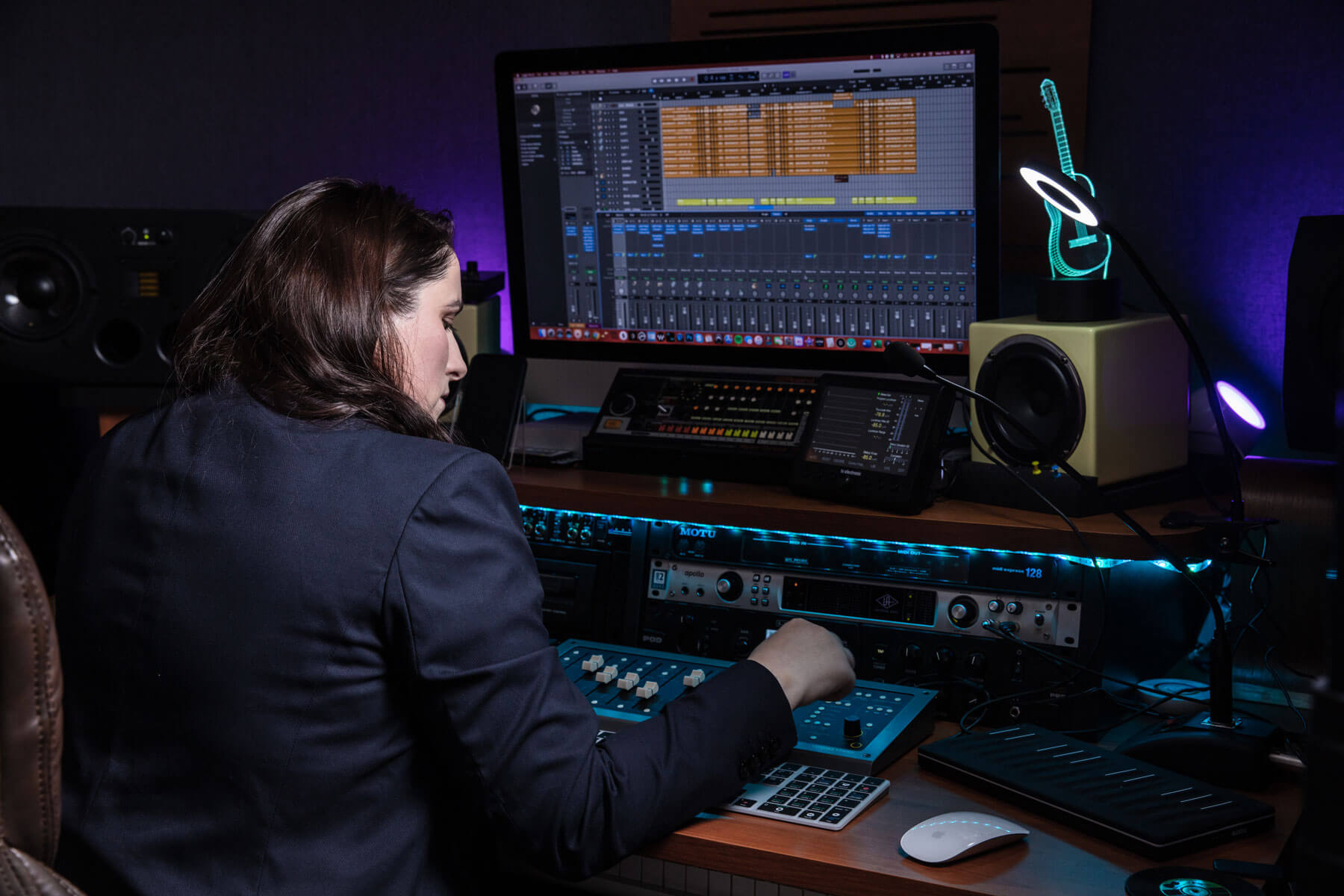
“I think experience is really important. I’m a much better producer now than I was last year or the year before. Because producing and mixing are both quite advanced skills, you can only get good through practice and time – it's a marathon, not a sprint.
“I’m lucky enough to be in a position now where I will turn down work if I don't think the genre is suitable for me, or if I get a sense that the artist and I won't gel creatively. It's important to listen to the artist and understand their vision for the music. After all, I’m working for their vision, not mine.”
“Writing for TV and film was always something I wanted to do, but I didn't know how to get into it, as it's very competitive. Out of the blue, I got contacted by one of the music supervisors at BMG Production Music, who found me online and liked my work. Luckily, she was looking to increase the representation of women composers on their roster. She asked me to write a couple of piano ballads, and she liked them and gave me more work! And that was my 'in'.
“Stylistically, writing for TV and film is actually very different to writing commercial music. I have to give much more thought to the lyrics. For example, they have to be easy to understand – nothing cryptic – and often need to convey a particular situation or mood. Then the song structure has to make sense; there need to be 'edit points', such as pauses, to help music editors make their own cuts; and there has to be a firm resolution at the end of the song. But also, the quality of the writing, producing and mixing has to match that of hit records.”
“Yes, the briefs include a description of the style they want, including lyrical themes and a list of reference songs that I can use as a guide to get a feel for the precise thing they have in mind. Beyond that, though, I’m given complete freedom to write and produce the songs as I see fit.
“Once I've completed a first draft, the publishers will always come back with some feedback to ensure the songs are as good as they can be. This is why I love writing for TV and film so much: you get a brief which challenges you creatively, but you still have the freedom to create something that you want to create.”
“I think the single best career highlight was when my song 'Crash and Burn' randomly soared up the US Pop Chart in 2017, then charted in the Top Ten in three other countries. It was completely unexpected, and one of those moments I had dreamed about since I was a child. To wake up in the morning and to see my songs at the top of the US Pop Chart – without any kind of promotion either – was literally insane!
“In terms of writing for TV and film, I recently watched Love is Blind on Netflix, and as a bride was walking down the aisle in it, one of my songs started playing. I didn't expect it, so that was an amazing surprise!”
'Crash and Burn' by The Utopia, a duo comprising Aubrey Whitfield and Gaston Dalmau
“When I had less than 1000 followers on Instagram, I started posting music production tips and quotes from music producers, which started gaining me new followers. So I'd suggest really thinking about your audience and what you can offer them.
“Also, go to the social media accounts of the top producers in your genre, and start following their followers. Like their posts, make engaging comments on their posts, send them a DM, build a meaningful connection, and the likelihood is they will follow you back. It does take a lot of time and effort to build a following on Instagram – about the equivalent of one whole day a week, in my case – but it's well worth the effort.”
“It all comes down to credibility and visibility. You need to be a good writer, producer and mixer, so ensuring that your skills are up to scratch in all three is really important. Beyond that, my advice is to produce every day. Even if you don't have anyone to produce yet, produce your own music, enter remix competitions and collaborate with others. When you have several great songs under your belt, put together a showreel and use that to approach artists you want to work with. That's how I started out, and it was effective for me.”
“I was lucky enough to be included on the Alt Power 100 List in 2020, which was incredible! And the following year they asked me to be an ambassador/judge for the 2021 list. It's an initiative run by an organisation called SheSaidSo, in partnership with Patreon, to highlight people in the music industry who have significantly contributed to the community. There is a particular focus on women in music, and ethnic and gender minorities, so it's a great platform in which to showcase those in the music industry who are really making waves.”
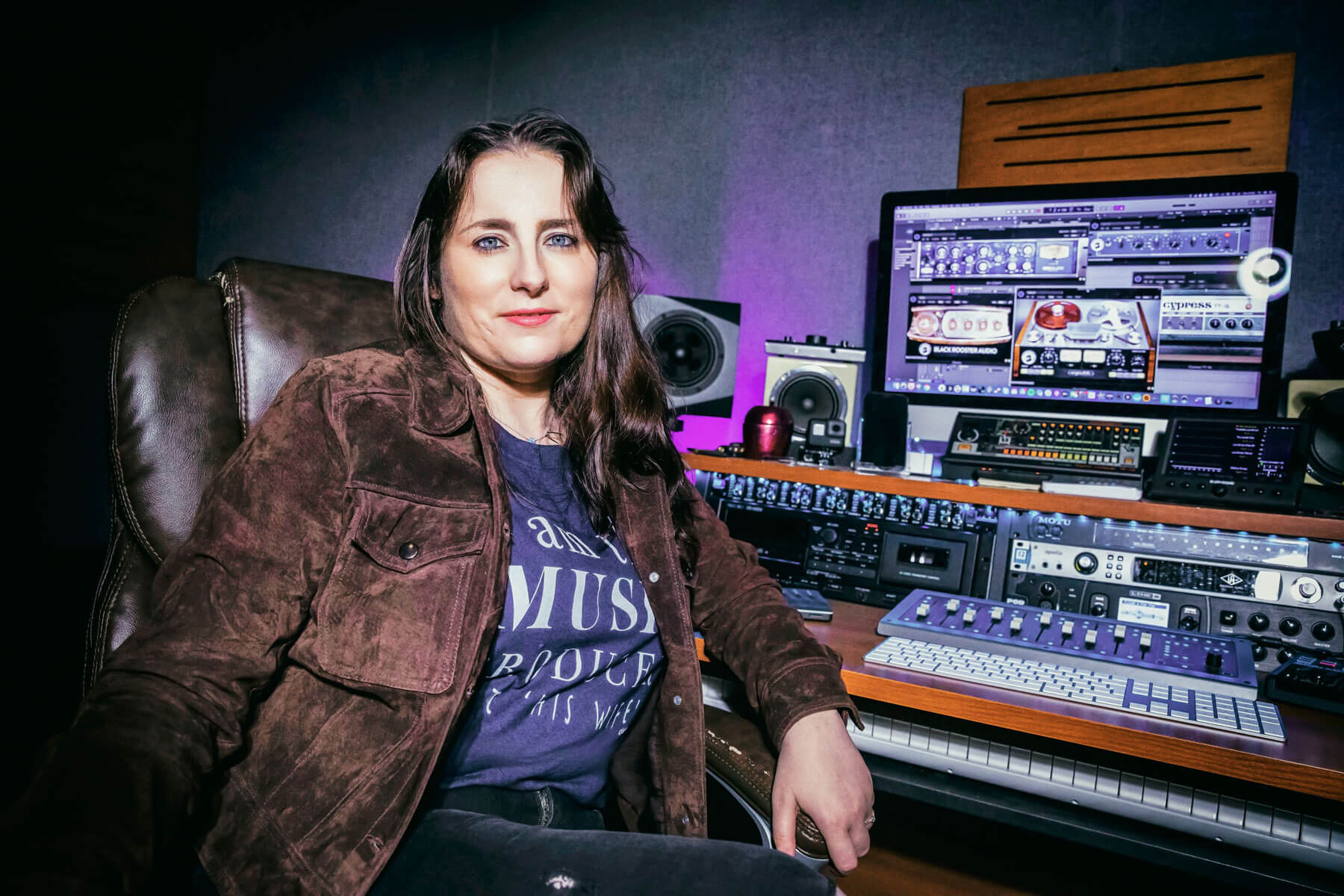
Aubrey is an ambassador for SheSaidSo's Alt Power 100 List – check out the honorees for 2021
“Inspiration and education are hugely important to me. As one of the rare few female producers, I feel it's important that I’m visible and share knowledge to help the next generation of women in music.
“I've found that too many producers are closed books, worrying that others will steal their techniques and ideas; but producing is a very personal and subjective thing, so educating the next generation with the basic tools needed to produce and mix is a great way to ensure that the industry relies less on AI for producing, and more on the talents and experience of producers.”

You can get these helpful ebooks at Aubrey's website
“I’ve seen more of a reliance on AI over the last couple of years. For example, we have services that now offer AI mastering which has affected mastering engineers, and I know that there’s talk about similar tools for mixing. I think we’re a long way off from relying on AI, and I really believe that producers will always be key to creating music, but I think the role of the producer in the future will change as these new tools are introduced.”
“What I love about ShaperBox is that I can get great sounds and effects quickly with it, which is really useful when you're up against deadlines, as I always am. And it works across a range of different genres, from pop and dance through to classical and sound design. But sound design is really where this plugin excels: using it to shape new sounds and create effects is so much fun.”
“Absolutely! CrushShaper, DriveShaper and NoiseShaper are all great for making sound effects that really help cut through the mix on TV screens. It's not ideal to use samples and loops for this line of work, in case it triggers copyright detection software, so I prefer to create my own effects, and ShaperBox is always the first tool I turn to to help me shape the sounds I want to create.”
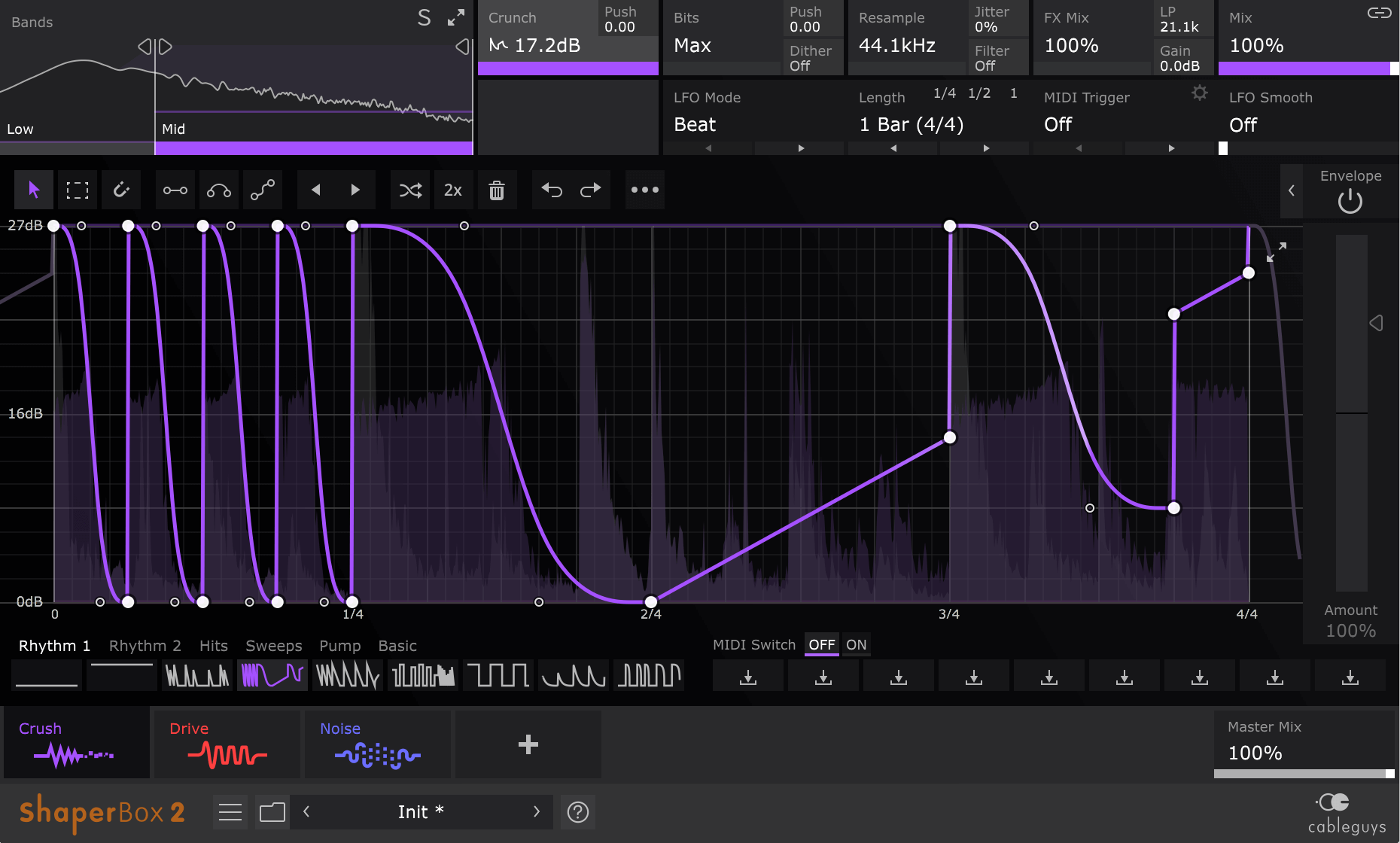
Crush + Drive + Noise = Aubrey's secret weapon for TV sound design
“My latest single, 'Secret Hideaway', makes great use of the VolumeShaper sidechain effect in ShaperBox. I placed it on both the bass and synth chords to create a smooth pumping effect and it just sounds great. 'Secret Hideaway' was a BBC Music Introducing… ‘One to Watch’ in March, and it's great that people are starting to take notice. You can take a listen to the track at songwhip.com/aubreywhitfield/secret-hideaway.”
“I use FilterShaper Core’s ‘Ramp up’ preset wave on synths, snare drums and sometimes the whole mix to create a build up into the next section. It's so simple to use and sounds so good. I remember hearing Kygo applying a similar effect to an acoustic guitar on one of his tracks, so now I do the same on my pop-dance tracks when going into a chorus – it sounds so exciting.
“Also, I recently re-discovered the amazing presets within ShaperBox. These are a great starting point for some weird and wacky effects!”
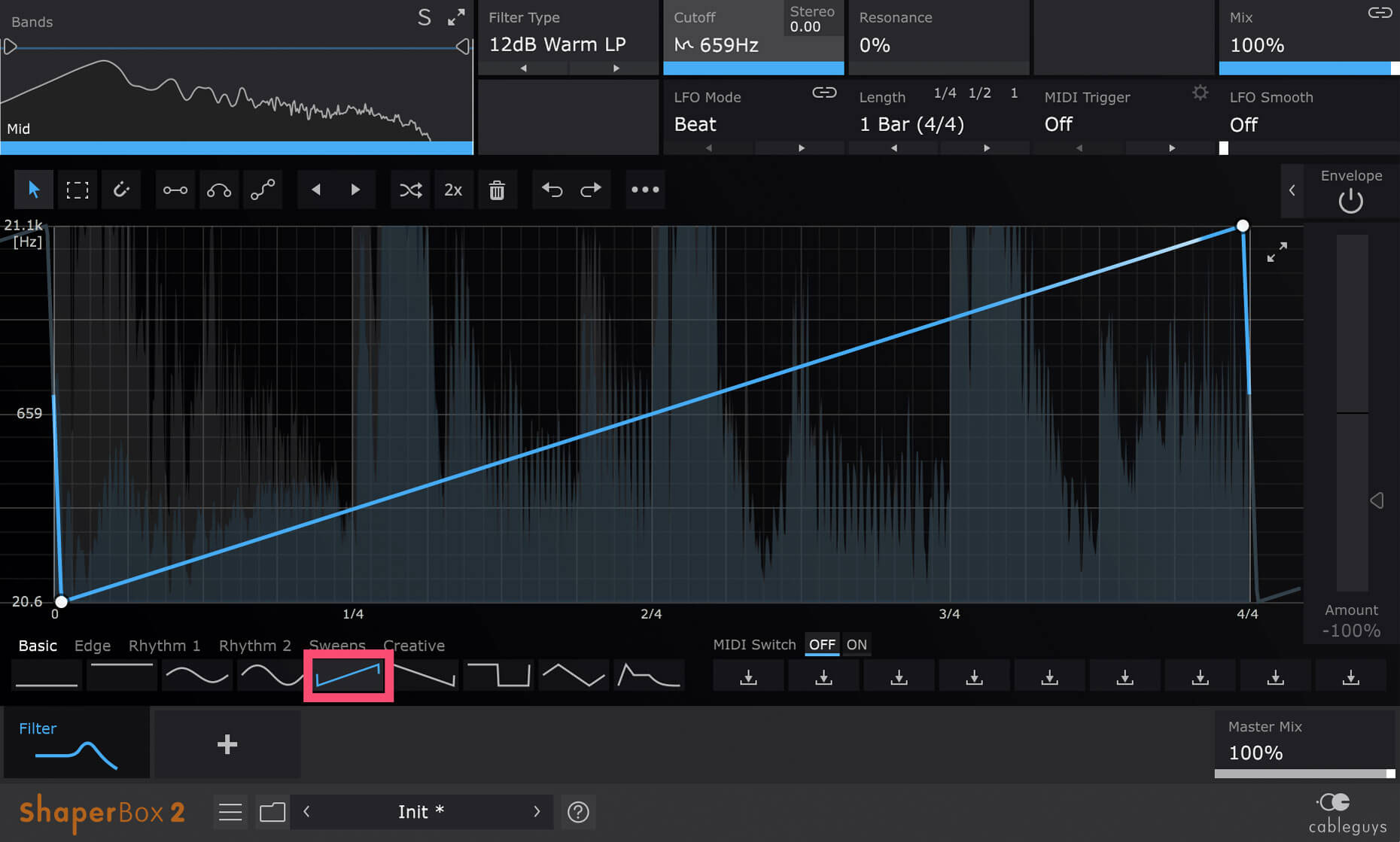
Aubrey uses the 'Ramp up' Wave Preset in FilterShaper Core as a go-to build effect
“I use FilterShaper Core on nearly every mix, but special mention also needs to go to TimeShaper, which helps me create so many creative and wonderful sounds. They’re great for not only shaping sounds, but also creating brand new sounds that no one else will have in their mixes. ShaperBox generally allows me to carve out my own signature sound, and I can't say that many other plugins do that!”
Download Curve 2.6.3 Demo (VST / AU / AAX):
WINDOWS
Windows 7 or later
MAC
OS X 10.9 or later
The demo is fully functional and has no time limit, but you can only use one instance per song and you can't save your settings.
Download FilterShaper XL 1.0.5 Demo (VST / AU / AAX):
WINDOWS
Windows 7 or later
MAC
macOS 10.13 or later
The demo is fully functional and has no time limit, but you can only use one instance per song and you can't save your settings.
Download HalfTime 1.1.11 Demo (VST / AU / AAX):
WINDOWS
Windows 7 or later
MAC
OS X 10.9 or later
The demo is fully functional and has no time limit, but you can only use one instance per song and you can't save your settings.
Download Kickstart 2.0.8 Demo (VST / AU / AAX):
WINDOWS
Windows 7 or later
MAC
OS X 10.9 or later
The demo is fully functional and has no time limit, but you can only use one instance per song and you can't save your settings.
Download MidiShaper 1.6.2 Demo (VST / AU):
WINDOWS
Windows 7 or later
MAC
macOS 10.13 or later
The demo is fully functional and has no time limit, but you can only use one instance per song and you can't save your settings.
Download ShaperBox 3.5.6 Demo (VST / AU / AAX)
— includes ReverbShaper, TimeShaper 3, DriveShaper 2, NoiseShaper 2, FilterShaper Core 3, LiquidShaper, CrushShaper 2, VolumeShaper 7, PanShaper 4, WidthShaper 3:
WINDOWS
Windows 7 or later
MAC
macOS 10.13 or later
The demo is fully functional and has no time limit, but you can only use one instance per song and you can't save your settings.
Download Snapback 1.1 Demo (VST / AU / AAX):
WINDOWS
Windows 7 or later
MAC
macOS 10.13 or later
The demo is fully functional and has no time limit, but you can only use one instance per song and you can't save your settings.
Download ShaperBox 3.5.6 Demo (VST / AU / AAX)
— includes ReverbShaper, TimeShaper 3, DriveShaper 2, NoiseShaper 2, FilterShaper Core 3, LiquidShaper, CrushShaper 2, VolumeShaper 7, PanShaper 4, WidthShaper 3:
WINDOWS
Windows 7 or later
MAC
macOS 10.13 or later
The demo is fully functional and has no time limit, but you can only use one instance per song and you can't save your settings.
Download ShaperBox 3.5.6 Demo (VST / AU / AAX)
— includes ReverbShaper, TimeShaper 3, DriveShaper 2, NoiseShaper 2, FilterShaper Core 3, LiquidShaper, CrushShaper 2, VolumeShaper 7, PanShaper 4, WidthShaper 3:
WINDOWS
Windows 7 or later
MAC
macOS 10.13 or later
The demo is fully functional and has no time limit, but you can only use one instance per song and you can't save your settings.
Download ShaperBox 3.5.6 Demo (VST / AU / AAX)
— includes ReverbShaper, TimeShaper 3, DriveShaper 2, NoiseShaper 2, FilterShaper Core 3, LiquidShaper, CrushShaper 2, VolumeShaper 7, PanShaper 4, WidthShaper 3:
WINDOWS
Windows 7 or later
MAC
macOS 10.13 or later
The demo is fully functional and has no time limit, but you can only use one instance per song and you can't save your settings.
Download ShaperBox 3.5.6 Demo (VST / AU / AAX)
— includes ReverbShaper, TimeShaper 3, DriveShaper 2, NoiseShaper 2, FilterShaper Core 3, LiquidShaper, CrushShaper 2, VolumeShaper 7, PanShaper 4, WidthShaper 3:
WINDOWS
Windows 7 or later
MAC
macOS 10.13 or later
The demo is fully functional and has no time limit, but you can only use one instance per song and you can't save your settings.
Download ShaperBox 3.5.6 Demo (VST / AU / AAX)
— includes ReverbShaper, TimeShaper 3, DriveShaper 2, NoiseShaper 2, FilterShaper Core 3, LiquidShaper, CrushShaper 2, VolumeShaper 7, PanShaper 4, WidthShaper 3:
WINDOWS
Windows 7 or later
MAC
macOS 10.13 or later
The demo is fully functional and has no time limit, but you can only use one instance per song and you can't save your settings.
Download ShaperBox 3.5.6 Demo (VST / AU / AAX)
— includes ReverbShaper, TimeShaper 3, DriveShaper 2, NoiseShaper 2, FilterShaper Core 3, LiquidShaper, CrushShaper 2, VolumeShaper 7, PanShaper 4, WidthShaper 3:
WINDOWS
Windows 7 or later
MAC
macOS 10.13 or later
The demo is fully functional and has no time limit, but you can only use one instance per song and you can't save your settings.
Download ShaperBox 3.5.6 Demo (VST / AU / AAX)
— includes ReverbShaper, TimeShaper 3, DriveShaper 2, NoiseShaper 2, FilterShaper Core 3, LiquidShaper, CrushShaper 2, VolumeShaper 7, PanShaper 4, WidthShaper 3:
WINDOWS
Windows 7 or later
MAC
macOS 10.13 or later
The demo is fully functional and has no time limit, but you can only use one instance per song and you can't save your settings.
Download ShaperBox 3.5.6 Demo (VST / AU / AAX)
— includes ReverbShaper, TimeShaper 3, DriveShaper 2, NoiseShaper 2, FilterShaper Core 3, LiquidShaper, CrushShaper 2, VolumeShaper 7, PanShaper 4, WidthShaper 3:
WINDOWS
Windows 7 or later
MAC
macOS 10.13 or later
The demo is fully functional and has no time limit, but you can only use one instance per song and you can't save your settings.
Download ShaperBox 3.5.6 Demo (VST / AU / AAX)
— includes ReverbShaper, TimeShaper 3, DriveShaper 2, NoiseShaper 2, FilterShaper Core 3, LiquidShaper, CrushShaper 2, VolumeShaper 7, PanShaper 4, WidthShaper 3:
WINDOWS
Windows 7 or later
MAC
macOS 10.13 or later
The demo is fully functional and has no time limit, but you can only use one instance per song and you can't save your settings.
Download ShaperBox 3.5.6 Demo (VST / AU / AAX)
— includes ReverbShaper, TimeShaper 3, DriveShaper 2, NoiseShaper 2, FilterShaper Core 3, LiquidShaper, CrushShaper 2, VolumeShaper 7, PanShaper 4, WidthShaper 3:
WINDOWS
Windows 7 or later
MAC
macOS 10.13 or later
The demo is fully functional and has no time limit, but you can only use one instance per song and you can't save your settings.
Buy Snapback Now!
€49 / $49, incl. VAT
Log in for upgrades (including Bundle upgrades).
Buy Curve 2 Now!
€119 / $129, incl. VAT
Log in for upgrades (including Bundle upgrades).
Buy FilterShaper XL Now!
€79 / $79, incl. VAT
Log in for upgrades (including Bundle upgrades).
Buy ReverbShaper Now!
€39 / $39, incl. VAT
Log in for upgrades (including Bundle upgrades).
Buy TimeShaper 3 Now!
€29 / $29, incl. VAT
Log in for upgrades (including Bundle upgrades).
Buy DriveShaper 2 Now!
€39 / $39, incl. VAT
Log in for upgrades (including Bundle upgrades).
Buy NoiseShaper 2 Now!
€39 / $39, incl. VAT
Log in for upgrades (including Bundle upgrades).
Buy FilterShaper Core 3 Now!
€39 / $39, incl. VAT
Log in for upgrades (including Bundle upgrades).
Buy LiquidShaper Now!
€29 / $29, incl. VAT
Log in for upgrades (including Bundle upgrades).
Buy CrushShaper 2 Now!
€39 / $39, incl. VAT
Log in for upgrades (including Bundle upgrades).
Buy VolumeShaper 7 Now!
€29 / $29, incl. VAT
Log in for upgrades (including Bundle upgrades).
Buy PanShaper 4 Now!
€29 / $29, incl. VAT
Log in for upgrades (including Bundle upgrades).
Buy WidthShaper 3 Now!
€29 / $29, incl. VAT
Log in for upgrades (including Bundle upgrades).
Buy HalfTime Now!
€10 / $12, incl. VAT
Log in for upgrades (including Bundle upgrades).
Buy MidiShaper Now!
€49 / $49, incl. VAT
Log in for upgrades (including Bundle upgrades).
Contains ReverbShaper, TimeShaper 3, DriveShaper 2, NoiseShaper 2, FilterShaper Core 3, LiquidShaper, CrushShaper 2, VolumeShaper 7, PanShaper 4, WidthShaper 3
Buy ShaperBox 3 Bundle Now!
€99 / $99, incl. VAT
Log in for upgrades (including Bundle upgrades).
Contains Snapback, Curve 2, FilterShaper XL, ReverbShaper, TimeShaper 3, DriveShaper 2, NoiseShaper 2, FilterShaper Core 3, LiquidShaper, CrushShaper 2, VolumeShaper 7, PanShaper 4, WidthShaper 3, HalfTime, MidiShaper
Buy Cableguys Bundle Now!
€179 / $179, incl. VAT
Log in for upgrades (including Bundle upgrades).
Buy Kickstart 2 Now!
€14 / $16, incl. VAT
Log in for upgrades (including Bundle upgrades).
Please enter your email address below. We will then set up a Cableguys account with your PanCake 2 download. This will also sign you up for the Cableguys newsletter.